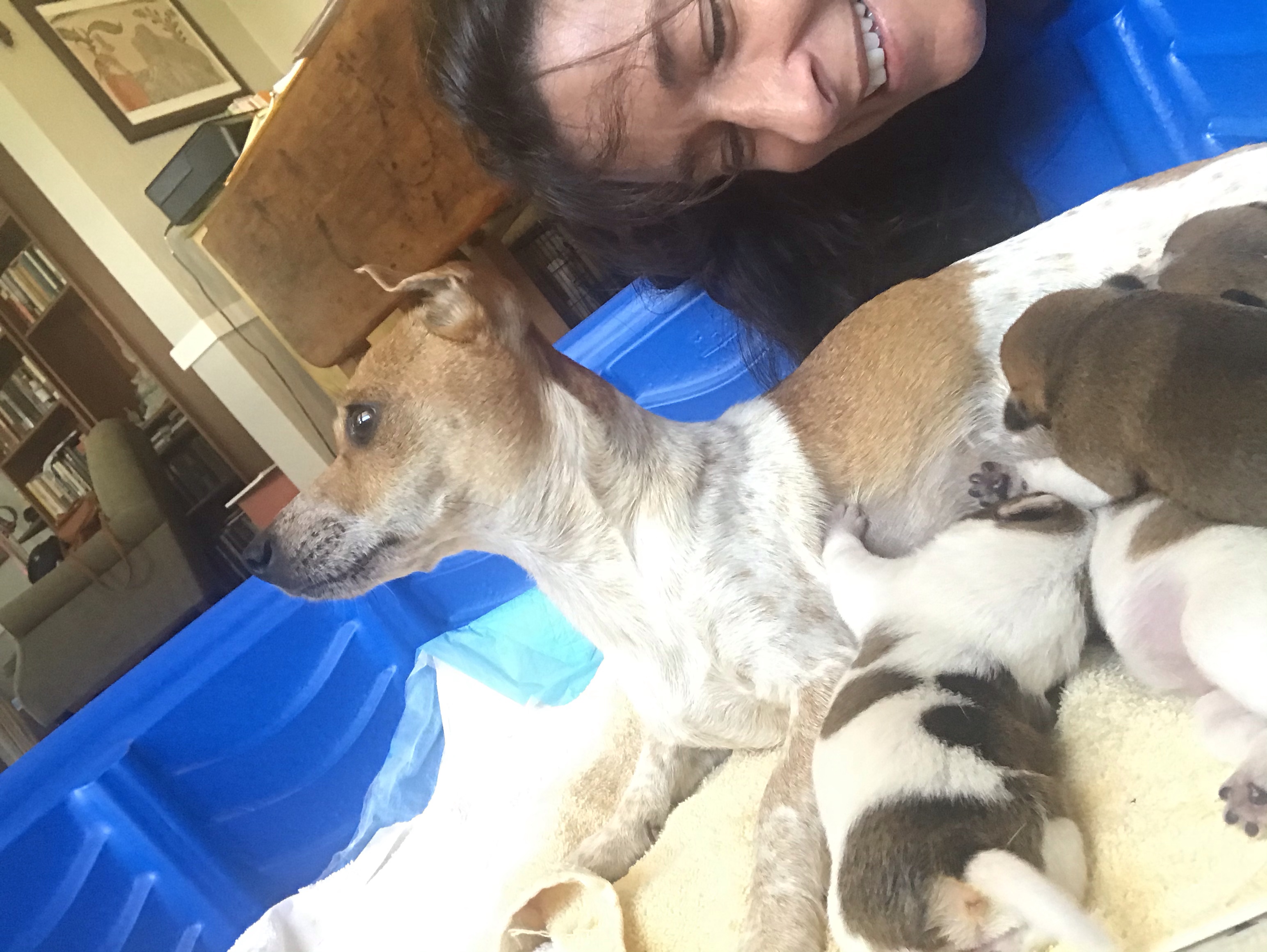Jan Peppler HOME
Exploring Our Connection to People and Place
Doggie Dad: The Archetypal Father

My rescue dog gave birth to 5 puppies one week ago and the congratulations poured in. “You’re a grandma!” was the most frequent. Very sweet sentiment. But it doesn’t feel right. The puppies won’t be staying with me. And I won’t be spoiling them. If anything, I feel like a dad.
My heroic save of the firstborn aside, there’s not much I can do right now. Momma does all the work. And, at least for the first few nights, she wanted me by her side.
I spent 10 hours on the floor watching the puppies after they were born. Really. I had a blanket and a pile of pillows, but mostly I propped myself up on one arm and watched. Finally, I decided it would be best to sleep in my bed. Twelve feet down the hall. Door open, I can hear every mew from the whelping pool.
But Momma had other ideas. Barely two hours after closing my eyes, Momma woke me. She had left her pups to come find me. I walked her back to the puppies, hung out for twenty minutes or so, then went back to bed. Two hours later, Momma was pawing at me again. Again, I got up and went back to the whelping pool. All the puppies were good.
What did Momma want? For me to look and admire? Each time she did this, she would crawl into my lap for a moment and together we would view the sleeping offspring. Then she’d jump back in and gather the pups around her. Licking them as each one came near, their rumps in the air as Momma cleaned them.
Momma knows what she’s doing. And she’s doing it well. I just can’t help feeling that what she wants is constant assurance that she’s not alone.
Archetypally, home is the realm of Mom, not of Dad. Mom nurtures those inside this safe place while Dad straddles the worlds and exists mostly outside of the home. To put it another way, Mom is responsible for providing home while Dad is the bridge to leaving home.
In myth, the archetypal Father often lives in the sky, not on the earth. Earth is the realm of Mother. Father moves between the earth and the heavens.
In Greek mythology the Father is Zeus. He sires dozens of children with multiple consorts while playing on earth but always returns to Olympus. In Judaism, God the Father is creator of all living things, sitting on a throne in the sky. This same Father is the first aspect of God in the Christian trinity. Similarly, in the Hindu trinity, Brahma sires the universe and then is basically never seen or heard from again. In the Navajo tradition, the great sun god Jóhonaa’éí, is father to Monster Slayer, the son who will rid the earth of destructive monsters. All of these fathers are at a distance, far away. Responsible for creation but not involved in daily life.
Movies echo this archetype of the distant Sky Father. In the 2014 blockbuster, Guardians of the Galaxy, the father of the protagonist, Peter Quill, was “an angel”, from another galaxy who left earth before his son was born. Interstellar, also from 2014, features a father who leaves his children to save the world and spends the rest of their lifetimes in space. Yet his distance is what motivates his daughter to study science and ultimately save the world. Thirty years prior in the film The Terminator, John Connor—the boy who will lead humans to victory over machines—was sired by a man from the future. He comes from another time to create a son who will be a modern monster slayer.
Then there is George Bailey in It’s a Wonderful Life. While very much a loving father, George is not grounded in the home. Every time he touches the knob on the staircase it comes off in his hands. George belongs in the office. When he comes home, he is distracted. When he tries to take care of family issues that his wife already has under control, he makes matters worse. George Bailey is a father who lives in his work. His actual job is, in fact, to assist others in finding new homes!
The role of the Father—at least archetypally—is to encourage the child to leave home, to have an adventure and discover a new world for themselves. He prepares the child to become an adult and find or create a home separate from Mom.
When the actual father is deceased, a substitute may step into this archetypal role.
In the Harry Potter series, Harry’s father dies when he is a baby. The great wizard, Albus Dumbledore, headmaster of Hogwarts, is Harry’s Father figure. While Hogwarts is Harry’s home, Dumbledore does not concern himself with many of the internal details of the school. Instead, he is active in the wizarding world and often away on business. He allows Harry freedom for his adventures and provides sage council as he needed. His influence eventually convinces Harry to leave Hogwarts and to embrace the power of who he is.
In some cases, when there is no Father to inspire the child to leave, the child will remain at home. Again, a surrogate Father is necessary.
In Ben Stiller’s 2013 film adaptation of The Secret Life of Walter Mitty, Walter’s father dies when he is sixteen, leaving him to take care of his mother and younger sister. For the next twenty years, even though he does manage to move out of his mother’s house and into his own apartment, he is so bound to home that he only leaves in his imagination. Every day, multiple times a day, Walter “zones out” as he imagines himself being a hero, being bold and doing extraordinary things. Despite being incredibly responsible, has never really grown up, he has not come into his own. His father gave him a backpack, encouraging him to travel the world, but didn’t live long enough to push him out of the nest.
Eventually, the world-renowned and mysterious photographer Sean O’Connell steps into the Father archetype. While O’Connell and Walter have never met, O’Connell chose Walter as the only person he trusts with his photographs. As Life Magazine prepares to shutter its doors, O’Connell sends Walter what he believes is the best photo he has ever taken, one that he hopes will be on the final cover. Along with the photo negative, he sends Walter a gift: a leather wallet with a personal dedication and Life’s motto embossed inside. “To see the world, things dangerous to come to, to see behind walls, to draw closer, to find each other and to feel. That is the Purpose of LIFE.“
This gesture is a classic father’s gift. What every young adult will need in order to leave home. A place to hold their currency (not only money, but metaphorically their personal power), along with the urging – the push – to go out into the world.
Because O’Connell hid the negative, Walter is forced to leave home in search of it. He must find his archetypal Father and discover his gift. This quintessential hero journey transforms him. He returns home a man.
The critically acclaimed film, Good Will Hunting, is another powerful example of the need for a Father to push a child out into the world. Will is an orphan who suffered severe abuse in foster care. At twenty years old, he lives alone in a run-down apartment, works as a janitor, and hangs out with three best friends doing much of nothing. He is also a genius who refuses to embrace his extraordinary intellectual abilities. Instead, he intends to be a labor worker his entire life and never leave South Boston, the only home he has ever known. Eventually Will bonds with Sean Maguire, a therapist that the court orders Will to meet with regularly. Sean steps into the Father archetype for Will. The rules which he makes Sean follow are not arbitrary; rather, these rules are for Sean’s own good and assist in helping Sean take responsibility for his life. At the end of their last court-appointed therapy session, Sean hugs Will and tells him “Good luck, son.” After this, Will is able to move past his fears and leave on an adventure to become the man he was meant to be.
The Father archetype can appear in anyone.
In the novel (and subsequent movie of 2015), Brooklyn, Eilis’s sister, Rose, embodies the Father archetype when their father dies. Rose continues to live with their mother, but she is also an independent woman who plays golf and works as a bookkeeper in an office. It is Rose who arranges for Eilis to go to America, buys her new clothes, and provides her with money to survive until she is earning her own way.
In the hit musical Mamma Mia!, daughter Sophie is getting married but intends to keep living with her mother, helping her run the bed and breakfast. But, not knowing who her father is, she has always felt like a part of her is missing. When she sends wedding invites to the three men who slept with her mother, they all attend, and each pledges to share her as their daughter. Now the archetypal Father is finally present in her life and Sophie decides not to marry. Instead she insists that she and her fiancé should explore the world. The presence of Father has released her bondage to home: she is now free to leave.
Mother is home. Our first home and our connection to home. She is the comfortable womb, the place where we are taken care of and where we can just be. Father disturbs that comfort. Father calls us out of this safe place and requires us to think, to become conscious, to become.
My role these days is the archetypal Father. Mazie will always stay with me, but the puppies will not. At eight to ten weeks old, they will each leave the nest and find new homes. My role is to prepare them for life away from the comfort of Mom. Every day I agitate them with low doses of stress by performing neurological stimulation exercises. All of this is to help them adjust. To build their strength and immunity to be successful in the world, in their lives. Maybe a bit irritating in the moment yet done with love for a greater purpose.
LOL! Definitely not puppy grandma. I am a Doggie Dad!



Great blog post, Jan! Love how you discussed the archetypal father figure in the context of you and your relationship with the pups. On a related note, I have a student working on a dissertation who wants to investigate how African American women living in the western United States who grew up fatherless describe the challenges associated with forming and maintaining adult committed relationships and the strategies used to overcome those challenges. None of the research that she cited in her literature review came close to addressing having the confidence to leave home and form relationships as one of the missing aspects of not having a father around. Since she has yet to formally propose her dissertation, I am going to forward your post and ask her to consider probing for this aspect particular ‘challenge’. (PS. We adopted a 4 month old border collie/Aussie pup two weeks ago. Athena seems to enjoy having a ‘sister’ to play with.)
LikeLiked by 1 person
Congratulations on the new pup!! That’s wonderful! 😊🐾 I’m glad you like the post. Much of this is taken from my dissertation. I’d be happy to speak with your student as well. I may be able to provide her with additional resources to consider. Always great to hear from you!! The mythical, the mystical, and the mundane- hey this post might just hit on all three! 🧡✨
LikeLike